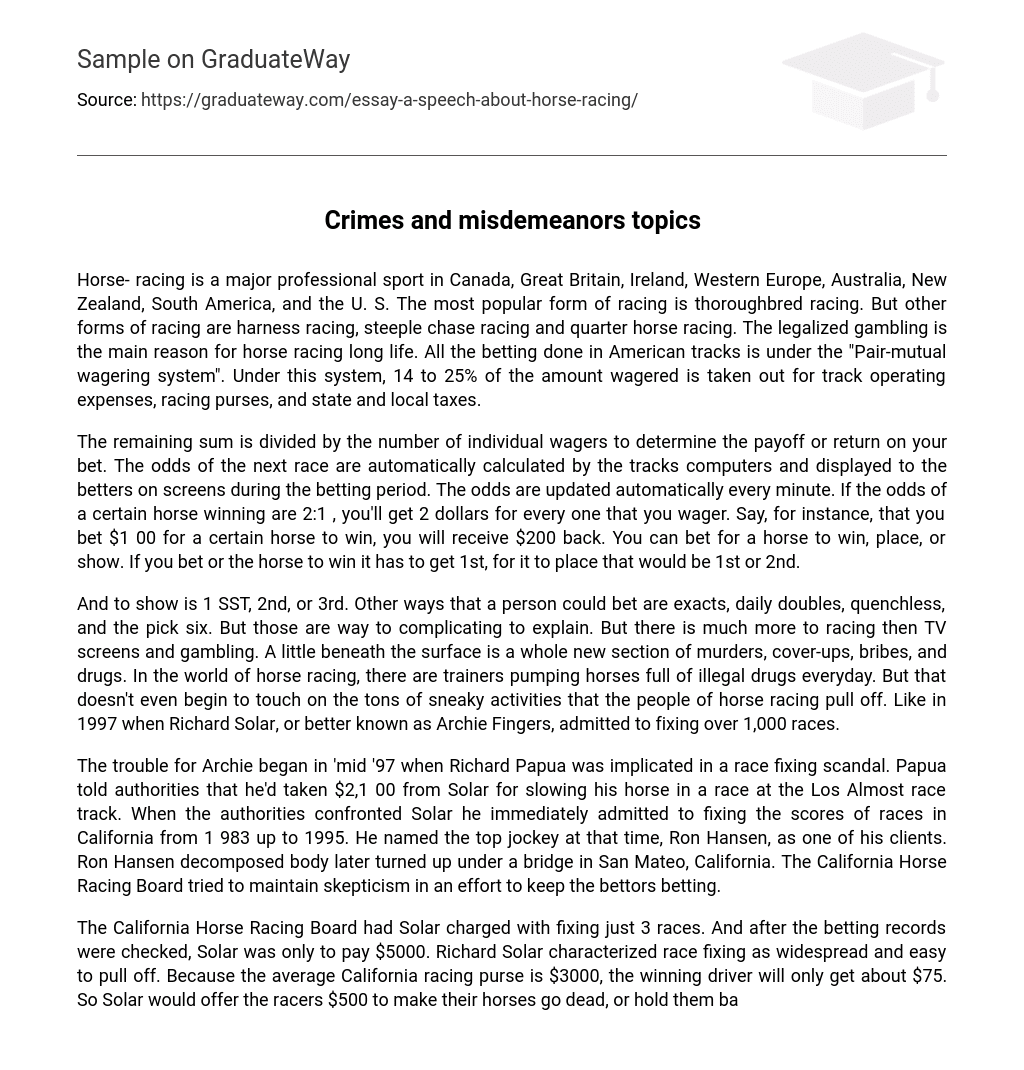Horse-racing is a major professional sport in various countries including Canada, Great Britain, Ireland, Western Europe, Australia, New Zealand, South America, and the U.S. Thoroughbred racing is the most popular type of racing, although there are also other forms such as harness racing, steeple chase racing, and quarter horse racing. The longevity of horse racing can be attributed to the legalization of gambling. In American tracks, all the betting is conducted using the “Pair-mutual wagering system”. This system deducts 14 to 25% of the wagered amount for expenses related to track operation, racing purses, and state and local taxes.
The payoff or return on your bet is calculated by dividing the remaining sum by the number of individual wagers. The odds for the next race are automatically calculated and displayed on screens during the betting period, with updates every minute. If a horse’s odds of winning are 2:1, you will receive 2 dollars for every dollar wagered. For example, a $100 bet on a certain horse to win will result in a $200 return. You can choose to bet on a horse to win, place, or show. To win, the horse must come in 1st; for it to place, it must come in either 1st or 2nd.
There are multiple ways to place bets in horse racing, including showing for 1st, 2nd, or 3rd place. Additional complex betting methods encompass exacts, daily doubles, quenchless, and the pick six. However, horse racing encompasses more than just TV screens and gambling. Below the surface lies a sinister world of murders, cover-ups, bribes, and drugs. Unethical trainers frequently administer illegal substances to horses. Additionally, individuals involved in horse racing engage in numerous deceptive activities. For instance, in 1997 Richard Solar (also known as Archie Fingers) admitted to manipulating over 1,000 races.
Archie’s troubles started in ‘mid ’97 following Richard Papua’s involvement in a race fixing scandal. Papua confessed to authorities that he had accepted $2,100 from Solar to intentionally slow down his horse during a race at the Los Almost race track. When confronted by authorities, Solar openly admitted to manipulating the outcomes of numerous races in California between 1983 and 1995. He also implicated Ron Hansen, the top jockey at the time, as one of his clients. However, Ron Hansen’s decomposed body was later discovered under a bridge in San Mateo, California.
The California Horse Racing Board attempted to maintain doubt in order to ensure that bettors continued placing bets.
The California Horse Racing Board accused Solar of fixing only 3 races. Upon reviewing the betting records, Solar was found liable for a payment of $5000. Richard Solar considered race fixing to be pervasive and easily executable. Considering that the typical prize for California races is $3000, the winning jockey would receive a mere $75. Because of this, Solar would propose a payment of $500 to the jockeys in exchange for intentionally underperforming or restraining their horses. Another problematic instance involves Chris Antler, who was renowned as one of the top jockeys worldwide in 2000, having achieved 3480 wins, two of which were victories in the Kentucky Derby.
Antler, a former drug addict in recovery, had a turbulent relationship with Timothy Tyler, who was both his roommate and fellow attendee at rehab. Money was an ongoing source of contention between them. Tyler notified the police that Antler had made threats against his wife’s life. Tragically, on December 2nd, 2000, Antler was discovered deceased in his apartment, with signs of forced entry and blood splattered on the walls. The authorities ruled it as a homicide and commenced questioning Tyler. During their investigation, it was revealed that Antler had succumbed to a downward spiral of drugs and alcohol and had been estranged from his wife in New York for several days.
Antler, a complete shut-in, was found dead. The police initially ruled it as accidental and Tyler was released. Antler’s best friend, Cathy Park, who discovered him deceased, told the police that she saw Tyler outside Antler’s residence with a crowbar at the time of his death. However, they refused to reopen the investigation. A later autopsy showed significant injuries on Antler’s neck but officially declared an overdose as the cause of death.
In recent times, several trainers have been suspended due to banned substances detected in their horses during post-race tests. People are willing to go to great lengths to enhance their horses’ performance because there is a lot of money involved. “Some of these banned drugs include penetrability and Culbertson which are advanced performance enhancers aiming to improve breathing and increase muscle endurance.” In June last year, Bob Barter – a two-time Kentucky Derby-winning trainer – faced suspension when morphine was found in his horse. Similarly, champion trainer John Bassett got suspended in January after his horse tested positive for cocaine.
Also, Tame Permian was suspended when five of her horses tested positive for penitentiaries, which is a central nervous stimulant similar to the drug Ecstasy. However, most states are not interested in exposing the widespread drug abuse due to the fear that owners may move to states with more lenient drug policies. Despite horse racing appearing to be a clean sport, there is much more to it than a small, lightweight jockey riding a horse around a track. Therefore, horse racing is far from an honest game.





